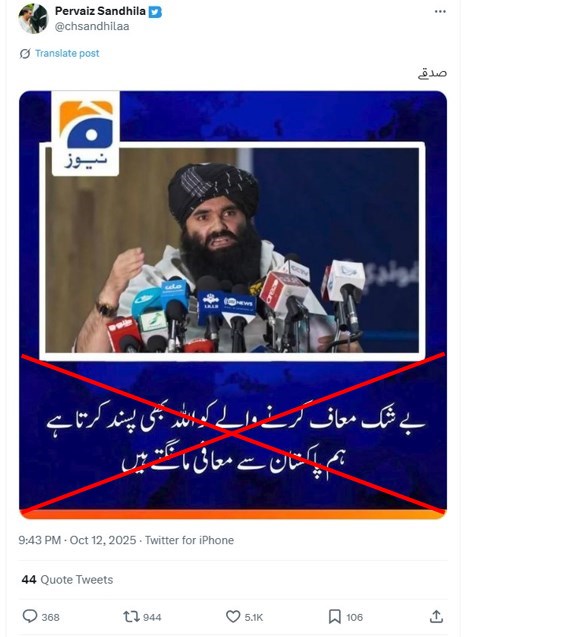Listen to the article
The recent ceasefire between Afghanistan and Pakistan has halted deadly border clashes that claimed numerous lives in October, but misinformation continues to spread online. False claims that Afghanistan’s Taliban government sought forgiveness from Pakistan have been circulating widely on social media platforms, using fabricated news content to mislead the public.
The manufactured post, designed to resemble reporting from Pakistan’s major broadcaster Geo News, featured a photo of Afghanistan’s Interior Minister Sirajuddin Haqqani alongside text in Urdu stating: “Indeed, God likes those who forgive. We ask Pakistan for forgiveness.” This fabricated content appeared on X (formerly Twitter) on October 12 and quickly gained traction across multiple platforms.
The timing of these false posts is significant, coming just one day after Taliban forces launched attacks against Pakistani troops along their shared border. Afghan officials described these actions as retaliation for alleged Pakistani airstrikes on Kabul. While Islamabad has not explicitly acknowledged conducting such strikes, Pakistani authorities have consistently maintained their right to defend against militant activities they claim are organized from Afghan territory.
Border tensions between the two nations have escalated repeatedly since the Taliban returned to power in Afghanistan in 2021. The October clashes resulted in significant casualties, though reported figures vary considerably between the two sides. Taliban government spokesman Zabihullah Mujahid claimed that 58 Pakistani soldiers were killed and approximately 30 wounded during the October 12 confrontation, while reporting nine Taliban casualties. In stark contrast, the Pakistani military stated that 23 of its soldiers were killed, alongside more than 200 Taliban and affiliated fighters.
The situation stabilized somewhat when a 48-hour ceasefire took effect late on October 15, according to officials from both countries. However, no credible reports indicate that Interior Minister Haqqani issued any apology or request for forgiveness to Pakistan during this period.
Manzar Elahi, head of digital output at Geo News, explicitly denied the organization published such content. “The post circulating on social media is false. Our newsroom has not published any such news,” Elahi told AFP on October 15. A comprehensive review of Geo News’ official website and social media accounts on X, Facebook, and Instagram revealed no evidence of the purported graphic.
Further analysis exposed additional inconsistencies in the fabricated post. Authentic Geo News social media content follows a consistent format that includes proper attribution and clearly identifies quoted individuals with their names and titles – elements absent from the fraudulent post circulating online.
The image manipulation was also apparent through reverse image searches. The photograph of Sirajuddin Haqqani used in the fake post originated from AFP’s archives, captured during an inauguration ceremony for a rehabilitation facility for drug addicts in Kabul on February 1, 2023, and was previously published by Arab News with proper attribution.
This incident highlights the ongoing information warfare surrounding the Afghanistan-Pakistan border conflict, where social media has become a battleground for narrative control. Tensions between the neighboring countries remain high despite the temporary ceasefire, with both sides maintaining hardline positions regarding security concerns and territorial sovereignty.
The fabricated news posts appear designed to influence public opinion, particularly among Pakistani audiences, by suggesting Afghan capitulation. This type of misinformation can potentially inflame nationalistic sentiments and complicate diplomatic efforts to achieve lasting stability in a region already plagued by decades of conflict and mistrust.
As border tensions continue to simmer between Afghanistan and Pakistan, fact-checking and media literacy remain crucial tools for citizens navigating complex geopolitical issues in an era of widespread digital manipulation.
Verify This Yourself
Use these professional tools to fact-check and investigate claims independently
Reverse Image Search
Check if this image has been used elsewhere or in different contexts
Ask Our AI About This Claim
Get instant answers with web-powered AI analysis
Related Fact-Checks
See what other fact-checkers have said about similar claims
Want More Verification Tools?
Access our full suite of professional disinformation monitoring and investigation tools




10 Comments
The border clashes are tragic, but claims of forgiveness seem questionable given the backdrop of continued military actions. Reliable information is essential to understand the nuances of this complex geopolitical situation.
Absolutely. Fact-checking and impartial analysis are needed to cut through the noise and rhetoric. Transparency from all parties involved would help build trust.
The spread of misinformation around the border clashes is worrying. Verifiable facts and impartial analysis are essential to understanding the complex dynamics at play between Pakistan and Afghanistan.
Agreed. Objective reporting and diplomatic efforts to address the root causes of the conflict are critical to achieving a lasting peace in the region.
While the ceasefire is a positive step, the disputed claims of forgiveness are troubling. Maintaining open communication and building trust between Pakistan and Afghanistan should be the focus moving forward.
Interesting development along the Pakistan-Afghanistan border. This highlights the ongoing tensions and mistrust between the two nations, even after the Taliban’s rise to power in Kabul. Fabricated news stories only serve to exacerbate the situation.
Agreed, the spread of misinformation is especially concerning in this volatile region. Verified facts and diplomacy are critical to deescalating the conflict.
The fabricated news about forgiveness is concerning. It’s crucial that reporting on this sensitive issue remains objective and factual to avoid further inflaming tensions between the neighbors.
Well said. Responsible journalism and transparency from all sides are needed to deescalate the situation and find a peaceful resolution.
Disputed claims of forgiveness amid ongoing violence highlight the challenges in the Pakistan-Afghanistan relationship. A durable ceasefire and diplomatic solution should be the priority, not misleading propaganda.